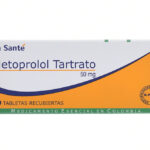How To Stop Taking Metoprolol Safely

Medication compliance or adherence refers to the degree or extent of conformity to the recommendations about day-to-day treatment by the provider with respect to the timing, dosage, and frequency. It may be defined as the extent to which a patient acts in accordance with the prescribed interval, and dose of a dosing regimen.
Adherence to therapies is a primary determinant of treatment success. Failure to adhere to the prescribed regimen is a serious problem that not only affects the patient but also the health care system. Medication non-adherence in patients leads to substantial worsening of disease, death, and increased health care costs.
What is Metoprolol?
Metoprolol is a medication used alone or in combination with other medications to treat high blood pressure. It also is used to prevent angina (chest pain) and to improve survival after a heart attack.
Metoprolol also is used in combination with other medications to treat heart failure. Metoprolol is in a class of medications called beta-blockers. It works by relaxing blood vessels and slowing heart rate to improve blood flow and decrease blood pressure.
Beta-blockers like Metoprolol work by preventing norepinephrine (adrenalin) from acting on beta receptors in blood vessels and in the heart. This causes blood vessels to relax. By relaxing the blood vessels, beta-blockers help to lower the heart rate and decrease the heart’s demand for oxygen. This in turn helps decrease blood pressure and reduce chest pain.
Metoprolol comes in two forms, metoprolol tartrate, and metoprolol succinate. The main difference between metoprolol tartrate and metoprolol succinate is that metoprolol tartrate is only available as an immediate-release tablet which means it must be taken several times per day, whereas metoprolol succinate is an extended-release tablet that can be taken once a day.
How should I use metoprolol?
Metoprolol comes as a tablet and an extended-release (long-acting) tablet to take by mouth. The regular tablet is usually taken once or twice a day with meals or immediately after meals. The extended-release tablet is usually taken once a day. To help you remember to take metoprolol, take it around the same time(s) every day. Follow the directions on your prescription label carefully, and ask your doctor or pharmacist to explain any part you do not understand. Take metoprolol exactly as directed. Do not take more or less of it or take it more often than prescribed by your doctor.
The extended-release tablet may be split. Swallow the whole or half tablets whole; do not chew or crush them.
Your doctor may start you on a low dose of metoprolol and gradually increase your dose.
Metoprolol controls high blood pressure and angina but does not cure them. Metoprolol extended-release tablets control heart failure but do not cure it. It may take a few weeks before you feel the full benefit of metoprolol. Continue to take metoprolol even if you feel well.
How To Stop Taking Metoprolol 25 mg
You should never stop taking metoprolol without first consulting your doctor because doing so can be fatal. Studies have shown that abruptly stopping metoprolol treatment can worsen angina and may increase the risk of a heart attack.
The only way to safely stop the medication is by working with your doctor to reduce the dosage of metoprolol gradually over a few weeks.
Your doctor may also recommend possible alternatives to metoprolol for people treating heart failure which can include bisoprolol and carvedilol. The better beta-blocker will be the one that works best for you. Other factors may play a role in choosing a beta-blocker, such as cost, side effects, and other medications you may be taking.
You may find useful information on Can You Take Viagra with Metoprolol Tartrate?





